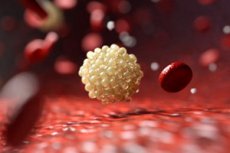
奥胡斯大学的一组研究人员取得了一项重大发现,有望改善癌症及其他一系列疾病的治疗。他们的研究成果发表在《自然通讯》杂志上。
成功的关键在于调节胆固醇水平,这可以使现有的治疗方法更有效。
“我们发现了一种新机制,可以调节对抗癌细胞的重要免疫途径,这让我们更深入地了解如何激活人体对疾病的防御能力,”该研究的最终作者之一、生物医学系的 Martin Roelsgaard Jacobsen 教授解释道。
研究人员重点研究了STING蛋白,它是免疫系统中抵御癌细胞的重要组成部分。通过控制胆固醇水平,他们能够改善STING蛋白的功能,从而开辟增强人体抗癌天然防御能力的新途径。
有效的癌症治疗取决于患者免疫系统的强度以及增强免疫系统摧毁癌细胞的能力。
雅各布森表示,治疗癌症需要多种策略的组合,包括诱导肿瘤局部免疫激活、募集细胞毒性T细胞以及刺激更广泛的免疫细胞激活。而新机制正是为此开辟了新的可能性。
他解释说:“STING 蛋白在癌症治疗中已展现出良好的前景,但我们尚未发现如何在临床环境中激活它。我们的研究提供了一种增强 STING 蛋白活性的新方法,为我们提供了另一种利用人体天然防御机制对抗癌症的方法。”
这项研究是奥胡斯大学和奥尔堡大学研究人员跨学科合作的成果,其中包括 STING 信号和癌症免疫学专家 Jacobsen 和 Emil Koffod-Olsen,以及对 STING 蛋白的分子生物学及其在多种疾病中的作用有深入了解的 Baocun Zhang 和 Søren Rees Paludan。

CGAMP通过SOAT1启动内质网胆固醇降低。来源:《自然通讯》(2024)。DOI:10.1038/s41467-024-47046-5
不同学科的结合对于将胆固醇水平与癌症的免疫反应联系起来至关重要。
“我们的发现是汇集不同领域专家的直接成果。这次合作为我们提供了关于如何更有效地抗击癌症的独特见解。”雅各布森说道。
胆固醇如何影响STING蛋白的发现不仅为癌症治疗开辟了新的可能性。研究人员还预计,这种机制将在对抗其他多种疾病方面发挥作用。
帕鲁丹教授说:“随着对 STING 工作原理及其对一系列疾病的影响的了解不断增加,现在看来更有可能开发一系列针对这些疾病的新药。”
这包括自身免疫性疾病和神经退行性疾病,其中免疫系统也发挥着至关重要的作用。

